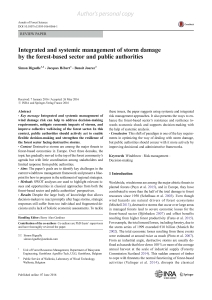Riguelle S., Hébert J., Jourez B.
Key message Integrated and systemic management of wind damage risk can help to address decision-making requirements, mitigate economic impacts of storms, and improve collective well-being of the forest sector. In this context, public authorities should actively act to enable flexible decision-making and strengthen the resilience of the forest sector facing destructive storms.
Context Destructive storms are among the major threats to forest-based economies in Europe. Over three decades, the topic has gradually moved to the top of the forest community’s agenda but with little coordination among stakeholders and limited response from public authorities.
Aims The paper’s goals are to identify key challenges in the current windthrow management framework and present a blueprint for how to progress in the settlement of regional strategies.
Methods SWOT analyses are used to highlight relevant issues and opportunities in classical approaches from both the forest-based sector and public authorities’ perspectives.
Results Despite the large body of knowledge that allows decision-makers to react promptly after huge storms, strategic responses still suffer from too individual and fragmented decisions and a lack of holistic economic assessments. To tackle these issues, the paper suggests using systemic and integrated risk management approaches. It also presents the ways to enhance the forest-based sector’s resistance and resilience towards economic shock and supports decision-making with the help of systemic analysis.
Conclusion This shift of paradigm is one of the key requirements in optimizing the way of dealing with storm damage, but public authorities should concur with it more actively by improving decisional and administrative frameworks.
Consultez la notice complète de l’article sur ORBi

